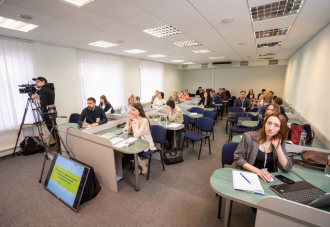Recently, the Commissioner of the Verkhovna Rada of Ukraine for Human Rights (hereinafter referred to as the Ombudsman/Commissioner) published the annual report on the state of observance and protection of human and civil rights and freedoms in Ukraine for 2022. It is currently registered with the Parliament and is awaiting consideration.
The report is a summarizing document presenting cases of violations of human and civil rights and freedoms in 2022 in the context of full-scale armed aggression against Ukraine, in respect of which the Ombudsman took response measures. It also contains conclusions and recommendations aimed at improving the state of ensuring human and civil rights and freedoms.
The document itself is substantial and lengthy, we will note the key aspects that may be interesting and useful to civil society.
However, the report is worth reading in its entirety.
- Summarizing the results of his work during his first year in office, the Ombudsman notes that systematic interaction with the human rights community takes place through meetings of the Advisory Councils (including the National Preventive Mechanism) under the Commissioner.
A thematic Expert Council has been established under each of the Ombudsman’s representatives, where they discuss current problems in the field of human rights protection and seek ways to minimize the negative consequences of armed aggression.
Also, human rights defenders are working as Advisors of the Ombudsman of Ukraine as part of the staff and on a voluntary basis.
- The section focusing on the rights of citizens who suffered as a result of the armed aggression against Ukraine has become much wider.
Thus, as a consequence of the armed aggression against Ukraine, there are a significant number of affected civilians, in particular those forced to leave their place of residence and move to safer territories inside or outside Ukraine, deported or forcibly displaced persons, as well as the population who have remained in the temporarily occupied territories or in areas where hostilities are taking place.
Internally displaced persons face numerous challenges and situations that require not only the response of the Ombudsman, but also the involvement of the state in their resolution.
In addition, as of early 2023, 13,899 children had been deported to the Russian Federation or forcibly transferred to the temporarily occupied territories of Ukraine (including 9,354 children deported directly to the Russian Federation), in violation of Articles 49 and 50 of the Geneva Convention relative to the Protection of Civilian Persons in Time of War.
Such facts of violations of international humanitarian law by the occupiers include the illegal mobilization of Ukrainian citizens in the temporarily occupied territories of Ukraine, which is expressly prohibited by the 1949 Geneva Convention relative to the Protection of Civilian Persons in Time of War (Art. 51).
- The section focusing on the protection of children’s rights is complicated, mentioning numerous cases of violations of the rights to life and health, healthcare for children with rare (orphan) diseases, right to education, and the like.
During the full-scale invasion of Ukraine, almost 70% of Ukrainian children were forced to leave their homes and move within the country or abroad. According to UNICEF, due to the armed aggression against Ukraine, 4.8 million Ukrainian children have changed their place of residence since February 24, 2022, of whom: 2.5 million children resettled within Ukraine, the rest went abroad.
- The section on the observance of human rights in the security and defense sector states that RF does not comply with the international humanitarian law regarding Ukrainian prisoners of war and civilians held in RF or on the territory of Ukraine temporarily occupied by it, their exchange or return.
In turn, Ukrainian military released from captivity testify to their ill-treatment and report facts of torture and physical and psychological violence. At the same time, civilian hostages held in the territory of the Russian Federation or in Ukraine are held incommunicado (that is, in complete isolation), deprived of the opportunity to inform their loved ones about the place of their stay, as well as of proper legal assistance.
- The issue of ensuring equality of human and civil rights and freedoms has not lost its relevance in Ukrainian society despite the unprecedented armed aggression against Ukraine, as evidenced by the relevant section of the Ombudsperson’s report.
During 2022, the observance of equal rights and freedoms was subject to assessment within the international human rights mechanisms.
On 02/09/2022, the UN Human Rights Committee adopted Concluding Observations to the 8th periodic report of Ukraine on the implementation of the International Covenant on Civil and Political Rights, where concerns were expressed about the lack of comprehensive anti-discrimination legislation that would comply with the provisions of the Covenant, and the lack of information about steps to address stigma and discrimination against multiple groups, including ethnic minorities, LGBTIQ communities, IDPs, and persons with disabilities.
On 11/01/2022, the UN Committee on the Elimination of Discrimination against Women has provided Concluding Observations to Ukraine’s 9th periodic report on the implementation of the UN Convention on the Elimination of All Forms of Discrimination against Women. The Committee is concerned that the military attack on Ukraine has caused gross violations of the human rights of Ukrainian women and girls.
At the same time, the Council of Europe Convention on Preventing and Combating Violence Against Women and Domestic Violence (Istanbul Convention) has entered into force for Ukraine.
The Ombudsman also notes the problem of the lack of possibility for same-sex couples to enter into a civil partnership in Ukraine and recommends the development of a relevant draft law, which should regulate the issues of jointly acquired property, inheritance, custody, social guarantees, the possibility of accompanying the minor child of a partner abroad, the right to decide on the possibility and scope of medical interventions or the right to bury a person, and so on.
- The key problems in the issues of the rule of law and access to justice were non-compliance with reasonable terms of judicial consideration of cases, violation of procedural rights during pre-trial investigation, improper execution of court decisions and decisions of other bodies (officials), restriction of access to court decisions.
Thus, from February 24 to June 20, 2022, full general access to the Unified State Register of Court Judgments (USRCJ) was restricted, as was access to website services such as “Judiciary of Ukraine”, “Case Consideration Status”, “List of Cases Assigned for Consideration”, which contained information about the day, time, place of the court hearing on the case. Cases of limitation of general access to judgments in the USRCJ still occur. This contradicts the requirements of the Law of Ukraine “On Access to Court Decisions”.
- The section on information rights indicates the presence of systemic violations of the constitutional rights of a person and citizen to information and appeals during 2022.
These include termination of consideration of requests for information, citizens’ appeals, non-disclosure of socially important information on official websites, closure of public registers, untimely provision of answers to citizens’ appeals and others.
Also during the year, the Commissioner recorded violations of the legislation on personal data protection: illegal processing of personal data, publication online of personal data of the Ukrainian military and foreign citizens who provide military aid to Ukraine during the period of martial law, excessive collection of personal data by providers of humanitarian, volunteer and other charitable assistance to the population, etc.
Based on the results of 2022, the Commissioner has provided a set of recommendations to be implemented by the relevant state authorities. The status of implementation of such recommendations will be researched and reported in the next annual report.
The Ukraine Civil Society Sectoral Support Activity project team advises reading the full text of the report here.
This material was created as part of the Project Ukraine Civil Society Sectoral Support Activity implemented by the Initiative Center to Support Social Action “Ednannia” in partnership with the Ukrainian Center for Independent Political Research (UCIPR) and Centre for Democracy and Rule of Law (CEDEM) with the sincere support of the American people through United States Agency for International Development.



